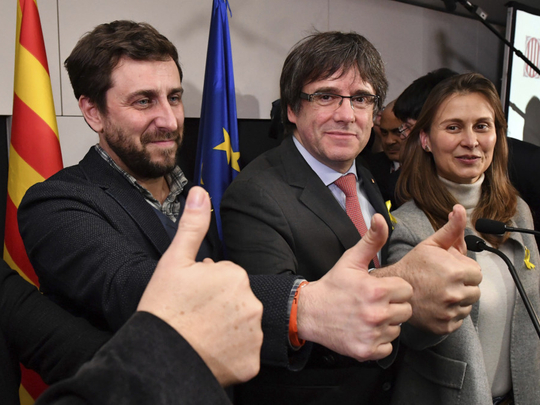
MADRID: Catalan independence parties fended off the challenge of Spanish unionists in a closely fought election Thursday. The separatist parties together hold an outright majority in the regional parliament, delivering a stunning rebuke to the Spanish government of Prime Minister Mariano Rajoy.
The three main separatist parties won 70 seats in the 135-seat assembly to restore the majority they lost when Rajoy used constitutional powers to dissolve the legislature, directly rule the restive province from Madrid and call the fresh elections. Those moves came after an illegal referendum held by the separatists on October 1, a plebiscite that was used by the Catalonians to declare their region independent from Spain.
Rajoy’s People’s Party was decimated in Thursday’s vote, losing eight of the 11 deputies. Instead, pro-Spanish unionist voters opted for Ciudadanos, a party that demanded a sterner line against the secessionists and their bitterly divisive policies. Ciudadanos is now the largest single party in the new regional assembly with 36 seats.
Inas Arrimadas, the leader of Ciudadanos, said of its strong showing: “We have sent a message to the world that a majority in Catalonia is in favour of the union with Spain. For the first time, a constitutionalist party has won a Catalan election.”
Junts per Catalunya, the party of former regional president Carlos Puigdemont, who fought the election campaign from self-imposed exile in Belgium, came in a close runner-up, winning 34 seats. The party, along with two smaller pro-independence parties, will likely be able to form a pro-independence coalition when the regional assembly convenes in the coming weeks.
Puigdemont’s former vice-president, Oriol Junqeras, leader of the Esquerra Republicana Catalana, is in prison along with two prominent pro-independence leaders.
Puigdemont said the results had demonstrated the strength of the Catalan people. “As Catalan president, I wish to congratulate people for delivering an indisputable result,” he said in Brussels. “We have won this election in exceptional circumstances, with candidates in prison, with the government in exile and without having the same resources as the state.”
Marta Rovira, number two on the ERC ticket, said the election showed that Catalans had voted for a republic. She said: “Now we have to reopen parliament and respect the democratic mandate.”
The results from Thursday’s election are officially declared on January 5, and the regional assembly then has 20 days to elect a speaker. It then has 10 days to elect a new regional president, with Puigdemont likely to be the separatists’ choice. What needs to be resolved between now and then is whether the Spanish government will pursue criminal sedition, rebellion and fraud charges against Puigdemont and others who organised the illegal referendum October.
The vote is the latest chapter in Spain’s worst political crisis since its return to democracy four decades ago. The results will be bruising for Rajoy and will do nothing to heal divisions in the region, which remains deeply and evenly divided over the independence issue. Any solution to the vexed question of Catalan sovereignty remains as elusive as ever.
At the end of October, MPs in the regional parliament again defied the central government by voting for independence by a margin of 70 votes to 10 as dozens of opposition MPs boycotted the secret ballot.
Rajoy responded by invoking the never-before-used article 155 to take control of Catalonia, sack the regional government and call the elections.












